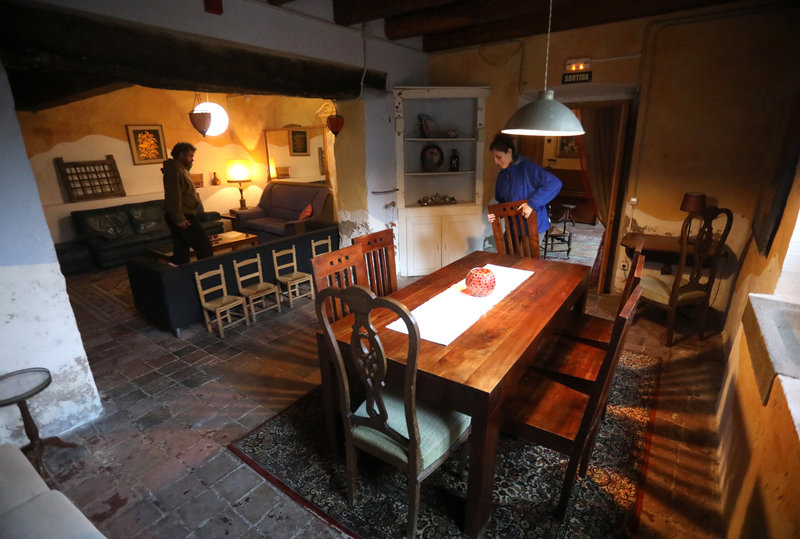The ’boom’ of rural tourism
Rural guest houses in Catalonia last year welcomed 487,766 people, who stayed 1.25 million nights, 3.1% more than before the Covid outbreak
In 2022, overnight stays in rural tourism establishments grew by 16% in Catalonia, according to the occupancy survey in rural tourism accommodation published in February by the Idescat statistics institute. In terms of where guests came from, the number of Catalan tourists grew by 1.4%, while those from the rest of Spain went up by 40.4%. Meanwhile, overnight stays by foreign tourists rose by 150.2% compared to a year ago, obviously due to the absence of international tourism because of the pandemic travel restrictions in 2021.
Rural tourism in Catalonia “has fully recovered; we have returned to the occupancy rates we had in 2019, or even better, and we can still grow more,” says Carles Barcons, president of the Confederation of Rural Tourism and Agritourism of Catalonia, Turalcat. Barcons insists that rural guest houses are “key” to attracting people and ensuring the financial viability of local businesses. “The people who stay in rural guest houses are at the same time customers for the products that are produced in the rural farms,” he says. What’s more, the average rural tourists, mostly families, take advantage of their stays to get to know the area, its heritage and traditions and to enjoy the outdoors and the natural environment.
According to the Catalan government’s General Directorate of Tourism, 487,766 people stayed in rural guest houses in 2022, staying 1,259,242 nights, which is 3.18% more than before the pandemic began.
Despite being subject to stringent health restrictions during the pandemic, rural guest houses were among the most used establishments. “We suffered during the pandemic but perhaps less than other types of tourist accommodation because we are small establishments, perhaps for a single family or group, and people greatly valued being in the middle of nature,” says Barcons.
Some 86% of people who use rural guest houses consider themselves ecotourists, says the latest Sustainability Report of the Rural Tourism Observatory, a research project promoted by the EscapadaRural booking portal, CETT-UB (the University Centre of Tourism, Hospitality and Gastronomy attached to the University of Barcelona) and survey specialists, Netquest. According to this study, sustainability is one of the most important aspects for rural tourists, and 41% of those people who consider themselves ecotourists say that enjoying nature responsibly is a priority when choosing a destination. This study also reveals that 58% of rural establishments claim that they already offer a sustainable tourist activity, while 26% say they are in the process of implementing one.
The problem that many people who work in mountain areas that are popular with tourists, such as Val d’Aran or Vall de Boí, but who cannot find a place to live due to the high rents “is not because of rural guest houses but rather tourist apartments,” says Barcons. As happens in cities, in rural areas many property owners prefer to rent out their apartments to tourists for short periods rather than letting to long-term tenants.
The Turalcat president also explains that after the pandemic, when some rural guest houses could no longer manage, some owners “changed the classification of the rural guest house to housing for tourist use in the countryside,” which basically changes the way the property is taxed and managed. To run a rural guest house, says Barcons, “the owner must be self-employed and live in or next to the municipality in which the property is located. However, the owner of a house for tourist use can live elsewhere and does not need to be self-employed.”
In Catalonia, there are more than 2,500 rural tourism establishments that between them offer almost 21,000 places, according to the Catalan tourism agency. These properties are of different types, from houses located in villages to isolated farmhouses. In the case of farmhouses, often the owner is a professional farmer who obtains their main revenue from growing crops, forestry, or raising livestock, but at the same time hosts guests who can complement their stay with the experience of taking part in the daily life of the farm.
Another category of rural accommodation is property in which the owner is not obliged to obtain farming revenue. According to the tourism agency, under this category there are four types of rural accommodation: masia (a farmhouse located outside the town that the guests share with the owners), masoveria (a detached house outside town for the exclusive use of the guests), casa de poble (a shared house in a village) and casa de poble independent (a house in a village exclusively for guests).
Feature Tourism
A leader in slow tourism
Catalonia wants to be a benchmark in slow tourism: responsible and sustainable tourism emphasising local culture and history while enjoying the natural environment. As part of the European Med Pearls project, the authorities, via the Catalan Tourism Agency (ACT), is granting subsidies for the creation of tourist products that respond to this philosophy. Under the terms of the Med Pearls project, the products have to be developed in areas with low tourist density but with a lot of potential for slow tourism. With these criteria in mind, the ACT has chosen the areas of Anoia, Garrigues and Ribera d’Ebre to become part of the project’s pilot plans. A total of six slow tourism products will be created and developed.

